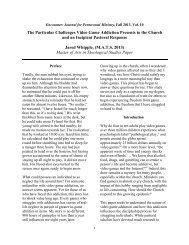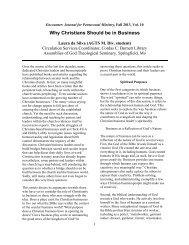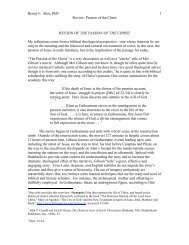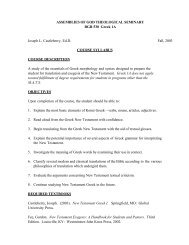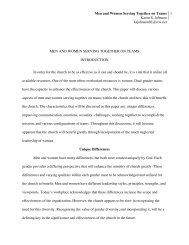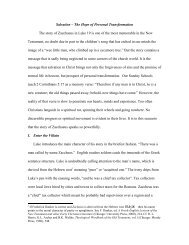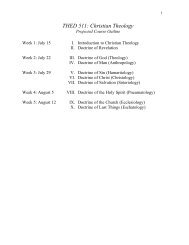Encounter: Journal for Pentecostal Ministry - Assemblies of God ...
Encounter: Journal for Pentecostal Ministry - Assemblies of God ...
Encounter: Journal for Pentecostal Ministry - Assemblies of God ...
Create successful ePaper yourself
Turn your PDF publications into a flip-book with our unique Google optimized e-Paper software.
correspondence provides noteworthy<br />
support <strong>for</strong> women leaders. 41<br />
Actions<br />
The backdrop <strong>of</strong> the society and culture <strong>of</strong><br />
the Roman Empire shows the significance <strong>of</strong><br />
the actions <strong>of</strong> the Early Church and, in<br />
particular, the Apostle Paul. The book <strong>of</strong><br />
Acts reveals that women became central to<br />
the growth and function <strong>of</strong> the church (e.g.,<br />
Lydia in Philippi, Acts 16:13-14). Luke lists<br />
the names <strong>of</strong> female converts among Jewish,<br />
Samaritan, and Gentile believers; he<br />
eventually lists the names <strong>of</strong> females be<strong>for</strong>e<br />
males to reveal their prominent church<br />
participation (Acts 5:14; 8:12; 17:4, 12, 16-<br />
17, 34). 42 The practice <strong>of</strong> identifying the<br />
female‟s contribution and participation in<br />
gospel expansion displays the countercultural<br />
actions reflective <strong>of</strong> Jesus. 43 Further,<br />
the listing <strong>of</strong> Tabitha (also called Dorcas) as<br />
“one <strong>of</strong> only two individuals recorded as<br />
being raised from the dead through the<br />
ministry <strong>of</strong> the Early Church” revealed the<br />
prominence <strong>of</strong> women. 44<br />
The Apostle Paul‟s counter-cultural actions<br />
shine in Philippians when he addresses two<br />
women, Euodia and Syntyche (4:2). Paul<br />
calls them “coworkers” (sunergos) (v. 3),<br />
the same term he uses regarding fourteen<br />
men. 45 He describes them as leaders<br />
contending alongside Paul <strong>for</strong> the gospel. 46<br />
The term refers to “athletic combat found in<br />
gladiator matches.” 47 The solution the<br />
Apostle Paul presents <strong>for</strong> the disagreement<br />
between these women reveals his elevated<br />
value <strong>for</strong> female church leadership (Phil.<br />
4:2-3). Rather than silencing these women<br />
leaders, he behaves in an opposite manner<br />
by encouraging them to cooperate and<br />
directing male leadership to assist their<br />
women coworkers. 48<br />
4<br />
Relationships<br />
Greetings, salutations, and brief references<br />
in the Pauline epistles provide clues to the<br />
Apostle Paul‟s valued ministry relationships.<br />
The Apostle Paul frequently mentions<br />
Priscilla, a female leader and prominent<br />
teacher in the Early Church. Priscilla and her<br />
husband, Aquila, appear multiple times<br />
throughout Acts and the Pauline epistles. In<br />
the book <strong>of</strong> Acts, Luke depicts the Apostle<br />
Paul‟s arrival in Corinth (Acts 18) also<br />
referencing Priscilla and Aquila. After the<br />
initial introduction <strong>of</strong> this team, the<br />
positioning <strong>of</strong> Priscilla‟s name in the text<br />
highlights her ministry prominence in<br />
Christian circles. 49<br />
Acts describes this excellent female teacher<br />
as the <strong>for</strong>emost instructor <strong>for</strong> the learned and<br />
fervent minister, Apollos (Acts 18:24-26).<br />
Evidence reveals Priscilla‟s presence in<br />
Ephesus, the very location <strong>of</strong> the female<br />
teacher controversy. The Apostle Paul greets<br />
her in 2 Timothy 4:19, and refers to her<br />
leadership, sacrifice, and boldness in his<br />
Roman letter (Rom. 16:3-5). The language<br />
he uses in both instances indicates a close<br />
relationship with this fervent ministry<br />
couple. The indication that their ministry<br />
extended beyond one specific region further<br />
reveals the prominence <strong>of</strong> their spiritual<br />
authority.<br />
The Apostle Paul also appears to value his<br />
relationship with the woman minister<br />
Phoebe, referring to her as the deacon or<br />
minister in the church <strong>of</strong> Cenchrea. Paul<br />
promotes her leadership by encouraging the<br />
church in Rome to receive and help her<br />
(Rom.16:1-2). Further, he indicates her<br />
significant contribution to his ministry<br />
through his use <strong>of</strong> the masculine <strong>for</strong>m <strong>of</strong><br />
diakonos. This term carries a general range<br />
<strong>of</strong> authority that the feminine <strong>for</strong>m<br />
abdicates. 50 In <strong>God</strong>’s Women—Then and




